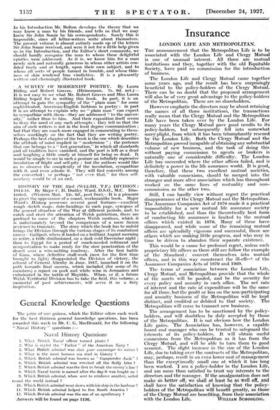Insurance
LONDON LIFE AND METROPOLITAN.
Tim announcement that the Metropolitan Life is to be associated with the London Life and Clergy Mutual is one of unusual interest. All three are mutual institutions and they, together with the old Equitable Society, have paid no commission for the introduction of business.
The London Life and Clergy Mutual came together some years ago, and the result has been surprisingly beneficial to the policy-holders of the Clergy Mutual. There can be no doubt that the proposed arrangement will also be of very great advantage to the policy-holders of the Metropolitan. There are no shareholders.
• However emphatic the directors may be about retaining the names of all three institutions, the transactions really mean that the Clergy Mutual and the Metropolitan Life have been taken over by the London Life. For many years the Clergy Mutual gave good results to its policy-holders, but subsequently fell into somewhat sorry plight, from which it has been triumphantly rescued by the London Life. Both the Clergy Mutual and the Metropolitan proved incapable of obtaining any substantial volume of new business, and the task of doing this without paying commission to agents or brokers is naturally one of considerable difficulty.- The London Life has succeeded where the other offices failed, and is definitely a power in the life assurance world. It is good. therefore, that these two excellent mutual societies, with valuable connexions, should be merged into the stronger and more alive association which has throughout worked on the same lines of mutuality and non. commission as the other two.
Still, I can hardly view without regret the practical disappearance of the Clergy Mutual and the Metropolitan. The Assurance Companies Act of 1870 made it a practical impossibility for a new mutual life assurance society to be established, and thus the theoretically best form of conducting life assurance is limited to the mutual offices which existed in 1870. Many of these have disappeared, and while some of the remaining mutual offices are splendidly vigorous and successful, there are others which are making little progress, and-who may in time be driven to abandon their separate existence.
This would be a cause for profound regret, unless such proprietary life offices as there still are follow the example of the Standard : convert themselves into mutual offices, and in this way counteract the ill-effeet of the Assurance Companies Acts of 1870 and 1909.
The terms of association between the London Life, Clergy Mutual, and Metropolitan provide that the whole of the assets will be pooled, and be the security for every policy and annuity in each office. The net rate of interest and the rate of expenditure will be the same for all three, but the profit or loss on the non-participating and annuity business of the Metropolitan will be kept distinct, and credited or debited to that society. The Metropolitan will cease to transact new business.
The arrangement has to be sanctioned by the policy- holders, and will doubtless be duly accepted by those of the Metropolitan. It is not obvious how the London Life gains. The Association has, however, a capable board and manager who can be trusted to safeguard the interests of its policy-holders. It will obtain useful connexions from the Metropolitan as it has from the Clergy Mutual, and will be able to turn them to good account. The slight increase in the size of the London Life, due to taking over the, contracts of the Metropolitan, may, perhaps, result in an even lower cost of management than the exceplonally small one at which it has long been worked. 1-am a policy-holder in the London Life, and am more than satisfied to trust my interests to the directors and the manager. If the amalgamation does not make us better off, we shall at least be as well off, and shall have the satisfaction of knowing that the policy- holders of the Metropolitan Will benefit greatly, as those of the Clergy Mutual are benefiting, from their association






























 Previous page
Previous page